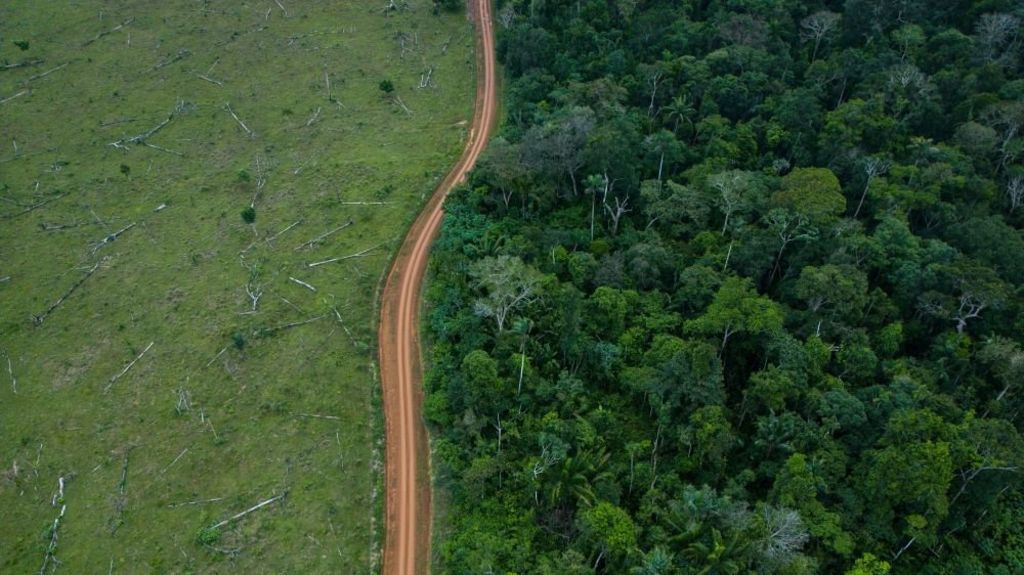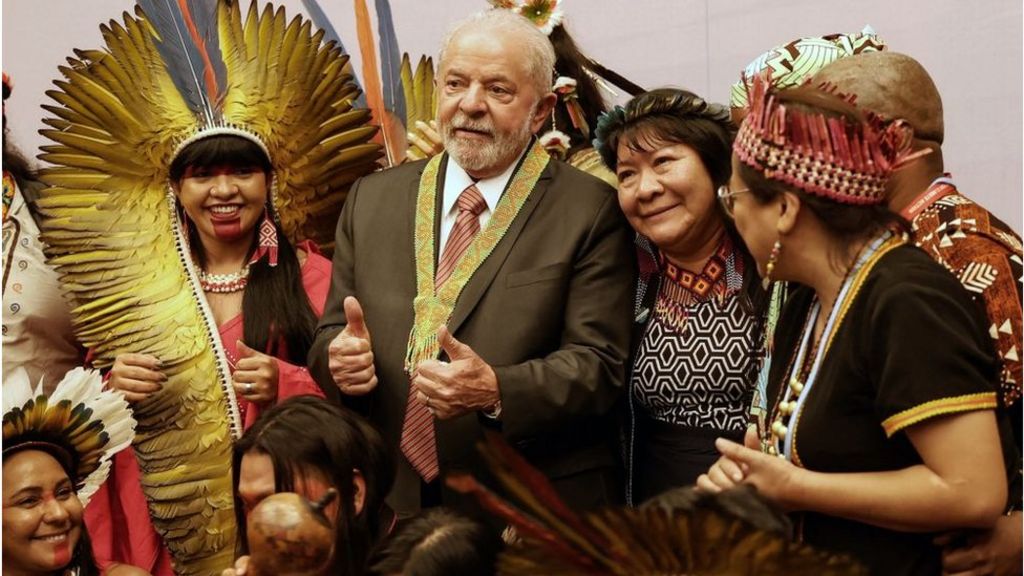Latin America
Related: About this forumClimate change: Logging decline after political change in Brazil, Colombia
2 days ago
By Matt McGrath,
Environment correspondent

Observers say government action in Colombia has led to a reduction in primary forest loss
The number of trees lost in tropical forests in Brazil and Colombia fell dramatically last year because of political action, a new analysis finds.
Researchers say new leaders have prioritised the environment, with tree losses in the Brazilian Amazon down by a huge 39%.
. . .

The return to government of President Lula has coincided with a dramatic drop in forest losses in Brazil
In 2023, the tropics saw 3.7 million hectares of forest lost - equivalent to 10 football fields per minute, a slight decline on last year. These losses would have been far higher if it wasn't for Brazil and Colombia.
According to this new analysis, political action in both countries has had a significant impact on tree felling.
President Luiz Inacio Lula da Silva came to power in Brazil last year promising to tackle tree losses and end deforestation by 2030.
As a result, there has been a 36% drop in primary forest losses in Brazil in 2023, compared to 2022.
"I think what we're seeing in Brazil, for example, is really a case of putting law enforcement back in place that was dismantled during the previous government," said Rod Taylor from WRI.
Given that Brazil was responsible for 43% of all tropical forest loss in 2022, this reduction is significant.
More:
https://www.bbc.com/news/science-environment-68716874
(What a shock, learning progressive leaders protect the interests of the people, rather than the 1%!)
Hermit-The-Prog
(36,587 posts)Judi Lynn
(162,375 posts)Apr 7th 2024| saõ paulo
. . .
The tree-loss figures are based on a new report by Global Forest Watch, a collaboration between the World Resources Institute, a non-profit in Washington, and researchers based at the University of Maryland. Using images collected by a nasa satellite, researchers map primary tropical forest across the globe on a 30m by 30m scale. By comparing these maps over time they can detect even small areas of tree loss. The data show whether trees were lost to fires, but further analysis is required to determine which tracts of forest are lost to intentional deforestation.
Brazil was the country with the largest decrease in deforestation last year. The country still lost more primary forest than anywhere else in the world—1,100 square kilometres, equivalent to around half the area of New Jersey—this figure was down 36% from 2022. It is Brazil’s lowest level of deforestation since 2015. Estimates from the country’s National Institute for Space Research also show a significant decrease, of 22% year on year, in the Brazilian Amazon between August 2022 and July 2023.
Much credit goes to Lula. In June he pledged to end deforestation in the Brazilian Amazon by 2030. He promised to reverse many of the anti-environmental measures put in place by his predecessor, Jair Bolsnaro, who slashed funding for Brazil’s environmental agency and fired its bosses.One part of Lula’s plan is to recognise new indigenous territories in the Amazon, thereby granting them legal protections against illegal miners and loggers. Indigenous land tends to suffer far less deforestation than that which is private. He resurrected the committee that designates these areas, and has been battling a bill put forward by the opposition that would scupper the process. So far only eight new territories have been recognised since January 2023, bringing the total number to 498, but at least 200 more are being processed.
Lula has also boosted law enforcement. Particularly during the Bolsonaro years, environmental crimes were often overlooked. The current president has pledged to open 39 new police bases across the Amazon. New technologies are helping. The Brazilian Federal Police now use daily images collected by Planet, an American satellite firm, and processed by sccon, a Brazilian tech company, to detect deforestation and track illegal activity in real-time. The programme claims to have resulted in over 140 arrest warrants and led to the collection of more than $3.1bn.
. . .
Mr Petro is the Amazon’s other new champion. According to the Global Forest Watch report, Colombian primary forest loss fell by a massive 49% in 2023, compared with 2022. Instead of losing an area roughly equivalent to 20 Manhattans, it lost around ten—660 square kilometres. Government estimates for the first nine months of 2023 corroborated Global Forest Watch numbers here, too.
When Mr Petro took office he announced a host of new policies to curb deforestation, including paying local people to prevent tree felling. But less-official actors have made a difference too. In May 2022 Estado Mayor Central (emc), an armed guerrilla group which controls sections of the Amazon, announced that it would enforce its own ban on deforestation. Where Mr Petro offered a carrot, emc preferred the stick. They announced a fine of 1m Colombian pesos ($250) for every hectare of deforestation. According to Al Jazeera, an emc spokesperson claims that their motivation is purely environmental, but some see its interest in nature as a bargaining chip for ongoing peace talks with the government. The future of Colombia’s forests is highly dependent on the government’s relationship with emc and other armed groups; deforestation surged after peace broke down in the country in 2016.
Internal politics are not the only force behind the reduction in deforestation. Rich countries like Germany, Norway and Britain are increasingly contributing to projects like the Amazon Fund, a $1bn initiative offering financial incentives to South American countries to stop or slow deforestation. Last year the eu’s Deforestation Regulation came into force. By the end of 2024 companies trading in seven different commodities must prove that their goods have not come from recently deforested land. Many private companies are also adopting voluntary measures to ensure they are not complicit in illegal deforestation at any point along their supply chain.
. . .
https://www.economist.com/the-americas/2024/04/07/brazil-and-colombia-are-curbing-destruction-of-amazon-rainforest